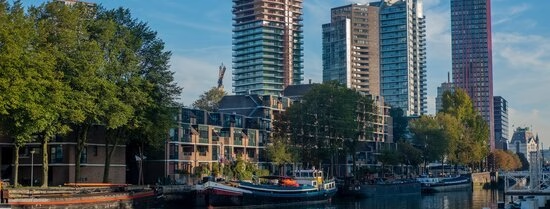What is it like to work as a young, international researcher at Erasmus University Rotterdam? In this interview, Novika Purnama Sari from Java talks about her experiences as a PhD student at Erasmus School of Social and Behavioural Sciences (ESSB). "Here, professors are more approachable than in Indonesia, and it is customary to address them directly by their first name, without a title."
How did you end up at Erasmus University?
In 2017, I received a grant from the Indonesia Endowment Fund for Education, Ministry of Finance, to do a PhD research on autism. I was allowed to conduct this research anywhere in the world. I sent an application letter to several universities worldwide and received several positive responses, including one from Erasmus Rotterdam University.
I chose ESSB because I was impressed by the work of Professor van IJzendoorn, the professor I would be working with here. Furthermore, my husband thought it was very important that we go to a country where we could still eat Indonesian food. Well, that is easily possible here!
What are you researching?
My research on autism amongst children is part of the Generation R Study at Erasmus Medical Center. This is a cohort study with ten thousand participants, including mothers and children. Generation R investigates the growth, development and health of growing children in Rotterdam. These children were followed up from early pregnancy and until young adulthood. In particular, my research explores the association between autistic traits in children and different kinds of predictors or outcomes (i.e. school achievement, peer relationship, behavior problems, parental age).
Did you also experience any cultural differences?
One big cultural difference I experienced is that in the Netherlands, there is little to no hierarchy. It is difficult to say 'no' or negotiate things to a superior in Indonesia, and you address professors by their title and first name. Here, professors are more approachable, and it is customary to address them directly by their first name, without a title. We are also allowed to disagree with their opinions. I had to get used to that at the beginning, but now I really like it.
Do you notice any other cultural differences between colleagues in the Netherlands and Indonesia?
Dutch people like to have an opinion, and they dare always to speak it up. That attitude inspires me to be more confident to speak up.
Another thing I find interesting is when someone does a presentation, and a question comes from the audience, and the person presenting doesn't know the answer, they will directly say, "I don't know". I didn't know what I was hearing! Back in Indonesia, you are expected to always have an answer to the audience's questions when you are presenting.
What strikes you about working at ESSB?
I admire the mentality here; the people are punctual and results-oriented. I want to take that attitude with me during the further course of my career. What I also like is that colleagues here actually take vacations seriously. There is a good balance between work and private life. You work hard during working hours, and you don't work outside these hours. It's different from Indonesia, where your boss can always call you, even on your days off.
Did you quickly connect with your colleagues?
It wasn't quick because at first, I wasn't confident enough to ask questions to colleagues at ESSB, I am the only employee of ESSB from Indonesia, and in the beginning, I thought it would be nice to have colleagues from Indonesia whom I could ask a couple of practical things like, "Where can I find a mosque?", "What are excellent Indonesian restaurants?" etc. But in fact, there were many friendly colleagues who helped me in various ways, from statistical things to social life.
Apart from your PhD, do you have any other activities at the EUR?
This year I am chairing the PhD Council of the Erasmus Graduate School of Social Sciences and the Humanities (EGSH). Together with other representatives of the EGSH PhD Council, we identify the satisfaction of PhD candidates toward PhD courses offered by EGSH.
You have also given birth to two children during your time here; what impact did that have?
That's right, I became a mother for the first time during the beginning of my PhD trajectory and recently had another child. At a time like this, I prefer to be in my home country, with my big family. But the work must go on. My grant is only for four years, and there is no room for maternity leave given by my particular grant; that is why I chose both times to go back to work as soon as possible. My husband and I arrange the childcare together; the flexibility to be able to work from home is also very helpful.
How do you envision your future?
I miss my home in Java very much, and we go back almost every year. First, I would like to gain more experience as a researcher in the field of autism here, so I can take the knowledge and skills I gained back to Indonesia.
- PhD student

